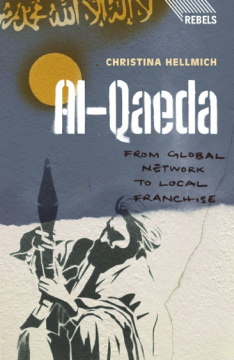
Additional Information
Book Details
Abstract
Since the attacks of September 11th 2001 and up to and beyond Osama bin Ladin's death, al-Qaeda has come to embody the new enigmatic face of terrorism, dominating discussions of national and international security. Yet in spite of the attention it receives, conflicting assumptions about the group abound. Is al-Qaeda a rigidly structured organization, a global network of semi-independent cells, a franchise, or simply an idea whose time has come? What is meant by talk of the ‘global Salafi jihad’ that is confronting the West? What are the implications of bin Ladin's death?
Christina Hellmich offers a critical examination of the widely-held notions regarding the origins and manifestations of al-Qaeda and the sources on which they rely, mapping the organisation’s alleged transition from what began as a regional struggle against the Soviets in Afghanistan to the increasingly leaderless jihad of the post-9/11 world. Rather than just providing yet another biography of al-Qaeda, Hellmich forensically examines discrepancies between the most common explanations and to the limits of what can realistically be known.
Drawing on a wide variety of sources, 'al-Qaeda: From Global Network to Local Franchise' offers a penetrating insight into an organization which, for all its notoriety, is one of the least-understood of our time.
Christina Hellmich is Lecturer in International Relations at the University of Reading.
'A comprehensive book filled with fresh material.'
Time Out
'A sensible, sharp, reasoned, comprehensive overview of analysis of modern Islamic militancy and discussion of the nature of the phenomenon of al-Qaeda.'
Jason Burke, author of al-Qaeda: The True Story of Radical Islam
'If you think you know anything at all about al-Qaeda or simply want an accessible introduction to the subject, this book is a must-read. For the novice and expert alike, Al-Qaeda by Christina Hellmich is currently the best book in the very large field of al-Qaeda studies. An eloquent and incisive deconstruction of the mythology surrounding al-Qaeda and a trenchant critique of the contradictions at the heart of Western security policy, Christina Hellmich delivers an intelligent and balanced assessment of perhaps the most misunderstood group in the world.'
Richard Jackson, Aberystwyth University, UK
'Undermines many of the widely held assumptions about al-Qa'ida.'
Nelly Lahoud, Associate Professor, Combating Terrorism Center, United States Military Academy, West Point
Table of Contents
| Section Title | Page | Action | Price |
|---|---|---|---|
| About the series\r | i | ||
| About the author | ii | ||
| Acknowledgements | vii | ||
| 1 | 9/11 and the anxious search for answers | 1 | ||
| 2 | What is al-Qaeda? From Afghanistan to 9/11 | 21 | ||
| 1986–91: the ‘birth’ of al-Qaeda | 22 | ||
| 1992–96 : al-Qaeda in Sudan and Afghanistan | 39 | ||
| 1996–2001: ‘gaining strength’ | 46 | ||
| Rethinking the analysis of al-Qaeda’s structure | 56 | ||
| 3 | Hypocrites, Wahhabis and Salafi jihadis: post-9/11 explanations of al-Qaeda’s ideology | 61 | ||
| Explaining the ideology of al-Qaeda in the shadow of the ‘war on terror’ | 63 | ||
| Towards an 'Islamic' explanation of al-Qaeda: the Wahhabi debate | 68 | ||
| Al-Qaeda: ‘The vanguard of the global Salafi jihad’ | 72 | ||
| Towards the ideology at the centre of al-Qaeda | 80 | ||
| 4 | Reclaiming the umma: the ideology of al-Qaeda in the context of the pan-Islamic tradition | 82 | ||
| Listening to Osama bin Ladin | 85 | ||
| Explaining the appeal of bin Ladin | 89 | ||
| The separation of ‘religion’ and ‘politics’ and the ideal of Muslim unity | 93 | ||
| The competition for sacred authority | 99 | ||
| Defending Islam: an individual duty | 105 | ||
| Reclaiming the umma: the origins of pan-Islamic sentiment | 107 | ||
| Towards pan-Islamic unity or bitter fragmentation? | 112 | ||
| 5 | Al-Qaeda post-9/11: destroyed, weakened or re-emergent? | 114 | ||
| Al-Qaeda: between conflicting assumptions? | 115 | ||
| ‘Al-Qaeda in the Arabian Peninsula’: evidence of al-Qaeda’s (re)emergence? | 127 | ||
| AQAP: ‘compartmentalized and hierarchical’? | 129 | ||
| AQAP in Yemen: one of many troubles | 137 | ||
| Yemen’s uneasy role in the war against terror | 141 | ||
| Rethinking the threat of AQAP in Yemen | 145 | ||
| The resurgence of al-Qaeda? | 149 | ||
| 6 | The future of Al-Qaeda | 152 | ||
| Notes | 169 | ||
| to Chapter 1\r | 169 | ||
| to Chapter 2 | 172 | ||
| to Chapter 3 | 177 | ||
| to Chapter 4 | 182 | ||
| to Chapter 5 | 186 | ||
| to Chapter 6 | 194 | ||
| Bibliography | 196 | ||
| Index | 207 | ||
| About Zed Books\r | 213 |
